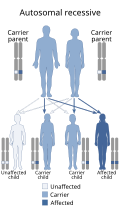Skin fragility syndrome
| Skin Fragility Syndrome | |
|---|---|
| Synonyms | Epidermolysis Bullosa Simplex, Dermatolysis, etc. |
| Pronounce | N/A |
| Specialty | N/A |
| Symptoms | N/A |
| Complications | N/A |
| Onset | N/A |
| Duration | N/A |
| Types | N/A |
| Causes | N/A |
| Risks | N/A |
| Diagnosis | N/A |
| Differential diagnosis | N/A |
| Prevention | N/A |
| Treatment | N/A |
| Medication | N/A |
| Prognosis | N/A |
| Frequency | N/A |
| Deaths | N/A |
Skin Fragility Syndrome (SFS) encompasses a group of rare genetic disorders that result in easy blistering of the skin and mucous membranes in response to minor trauma or friction. The conditions are generally classified based on the specific layer of skin affected and can range in severity from mild to life-threatening. The most common types include Epidermolysis Bullosa Simplex (EBS), Dystrophic Epidermolysis Bullosa (DEB), Junctional Epidermolysis Bullosa (JEB), and Kindler Syndrome.
Causes[edit]
Skin Fragility Syndrome is primarily caused by genetic mutations that affect the proteins necessary for the integrity and stability of skin structure. These proteins include keratins (in EBS), collagen (in DEB), and laminins (in JEB). The mutations can be inherited in an autosomal dominant or recessive manner, depending on the type of SFS.
Symptoms[edit]
The hallmark symptom of SFS is the formation of blisters and sores on the skin and mucous membranes due to minor mechanical trauma. Other symptoms may include:
- Nail dystrophy or loss
- Scarring
- Mucosal involvement leading to dietary and respiratory issues
- In severe cases, systemic involvement such as growth retardation and anemia
Diagnosis[edit]
Diagnosis of SFS is based on:
- Clinical examination
- Family history
- Skin biopsy for histological examination
- Genetic testing to identify specific mutations
Treatment[edit]
There is currently no cure for Skin Fragility Syndrome. Treatment focuses on managing symptoms and preventing complications. This may include:
- Wound care and infection prevention
- Pain management
- Nutritional support
- Physical and occupational therapy
- Use of protective bandages and clothing to minimize trauma
- Surgical interventions for severe complications
Prognosis[edit]
The prognosis for individuals with SFS varies widely depending on the type and severity of the disorder. While some individuals may lead relatively normal lives with minor adjustments, others may suffer from severe and disabling complications.
See also[edit]
References[edit]
<references group="" responsive="0"></references>
External links[edit]
Ad. Transform your life with W8MD's Budget GLP-1 injections from $75


W8MD offers a medical weight loss program to lose weight in Philadelphia. Our physician-supervised medical weight loss provides:
- Weight loss injections in NYC (generic and brand names):
- Zepbound / Mounjaro, Wegovy / Ozempic, Saxenda
- Most insurances accepted or discounted self-pay rates. We will obtain insurance prior authorizations if needed.
- Generic GLP1 weight loss injections from $75 for the starting dose.
- Also offer prescription weight loss medications including Phentermine, Qsymia, Diethylpropion, Contrave etc.
NYC weight loss doctor appointmentsNYC weight loss doctor appointments
Start your NYC weight loss journey today at our NYC medical weight loss and Philadelphia medical weight loss clinics.
- Call 718-946-5500 to lose weight in NYC or for medical weight loss in Philadelphia 215-676-2334.
- Tags:NYC medical weight loss, Philadelphia lose weight Zepbound NYC, Budget GLP1 weight loss injections, Wegovy Philadelphia, Wegovy NYC, Philadelphia medical weight loss, Brookly weight loss and Wegovy NYC
|
WikiMD's Wellness Encyclopedia |
| Let Food Be Thy Medicine Medicine Thy Food - Hippocrates |
Medical Disclaimer: WikiMD is not a substitute for professional medical advice. The information on WikiMD is provided as an information resource only, may be incorrect, outdated or misleading, and is not to be used or relied on for any diagnostic or treatment purposes. Please consult your health care provider before making any healthcare decisions or for guidance about a specific medical condition. WikiMD expressly disclaims responsibility, and shall have no liability, for any damages, loss, injury, or liability whatsoever suffered as a result of your reliance on the information contained in this site. By visiting this site you agree to the foregoing terms and conditions, which may from time to time be changed or supplemented by WikiMD. If you do not agree to the foregoing terms and conditions, you should not enter or use this site. See full disclaimer.
Credits:Most images are courtesy of Wikimedia commons, and templates, categories Wikipedia, licensed under CC BY SA or similar.
Translate this page: - East Asian
中文,
日本,
한국어,
South Asian
हिन्दी,
தமிழ்,
తెలుగు,
Urdu,
ಕನ್ನಡ,
Southeast Asian
Indonesian,
Vietnamese,
Thai,
မြန်မာဘာသာ,
বাংলা
European
español,
Deutsch,
français,
Greek,
português do Brasil,
polski,
română,
русский,
Nederlands,
norsk,
svenska,
suomi,
Italian
Middle Eastern & African
عربى,
Turkish,
Persian,
Hebrew,
Afrikaans,
isiZulu,
Kiswahili,
Other
Bulgarian,
Hungarian,
Czech,
Swedish,
മലയാളം,
मराठी,
ਪੰਜਾਬੀ,
ગુજરાતી,
Portuguese,
Ukrainian



